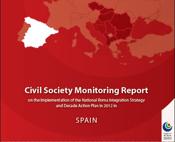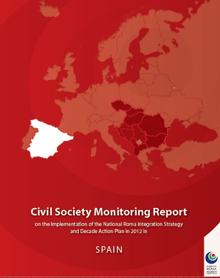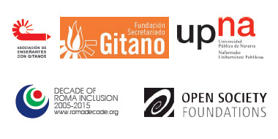Civil Society Monitoring Reports on the Implementation of National Roma Integration Strategies in eight European countries [editar]

The Spanish report was drafted by a coalition of civil society organisations led by the FSG, including the ALTER Research Group at the Public University of Navarra (UPNA) and the Asociación de Enseñantes con Gitanos (“Association of Teachers with Roma”).
The “Civil Society Monitoring Reports on the Implementation of the National Roma Integration Strategy and Decade Action Plan in 2012” in eight European countries, including Spain, have been made public today on the website of the Decade of Roma Inclusion.
The Spanish report was drafted by a coalition of civil society organisations led by the Fundación Secretariado Gitano (FSG), including the ALTER Research Group at the Public University of Navarra (UPNA) and the Asociación de Enseñantes con Gitanos (“Association of Teachers with Roma”). The lead researcher of the coalition is Michael Laparra (UPNA - ALTER Research Group).
The key findings of the Report on Spain include a positive assessment of the National Roma Integration Strategy (NRIS) as a strategic document and framework for the implementation of comprehensive measures aimed at Roma inclusion. Nevertheless, the effective implementation of the NRIS is threatened by the current economic crisis, which is resulting in significant budget cuts especially in the fields of public healthcare and education, as well as minimum income schemes, which are key to the inclusion of the Roma population. The report stresses that “the austerity measures could result in the apparent postponement of the implementation of the Strategy”.
This report was elaborated following a methodology based on the documentary analysis of official and unofficial documents and on the quantitative analysis of the available statistical data related to the objectives of the NRIS, complemented with the analysis of the information collected through qualitative research methods (structured and semi-structured interviews of numerous actors), which counted on the involvement of students, Roma and non-Roma, who are undertaking the University Diploma in Social Intervention with the Roma Community of the UPNA.
This project, which covers eight countries (Albania, Bulgaria, Hungary, Macedonia, Romania, Slovakia and Spain), is coordinated by the Decade of Roma Inclusion Secretariat Foundation in cooperation with the “Making the Most of EU Funds for Roma” programme and the Roma Initiatives Office of the Open Society Foundations.
According to the Decade of Roma Inclusion Secretariat Foundation, these reports are not intended to substitute the quantitative monitoring and evaluation by the state authorities, but rather to channel local knowledge into policy processes at national and European levels, and to reflect on the real social impact of government measures. The civil society reports provide additional evidence complementing official data, representative evidence in cases where there is no official data, or an alternative interpretation of the published data.

This project is coordinated by the Decade of Roma Inclusion Secretariat Foundation in cooperation with the “Making the Most of EU Funds for Roma” programme and the Roma Initiatives Office of the Open Society Foundations. The Spanish report was drafted by a coalition of civil society organisations led by the Fundación Secretariado Gitano (FSG), including the ALTER Research Group at the Public University of Navarra (UPNA) and the Asociación de Enseñantes con Gitanos (“Association of Teachers with Roma”).


